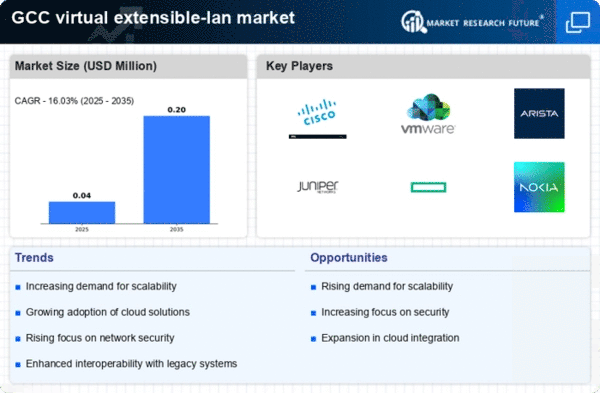Emergence of 5G Technology
The virtual extensible-lan market is expected to experience growth with the emergence of 5G technology in the GCC. The rollout of 5G networks is set to revolutionize connectivity, offering significantly higher speeds and lower latency compared to previous generations. This technological advancement creates new opportunities for businesses to implement innovative applications and services that require robust networking capabilities. As 5G adoption accelerates, the demand for virtual extensible-lan solutions is likely to increase, as organizations seek to leverage the benefits of high-speed connectivity. The GCC's proactive approach to 5G deployment positions the virtual extensible-lan market to capitalize on the enhanced networking landscape, potentially leading to increased market penetration and adoption.
Expansion of Smart City Initiatives
The virtual extensible-lan market is likely to gain momentum due to the expansion of smart city initiatives within the GCC. Governments in the region are investing heavily in infrastructure development to create smart urban environments that leverage technology for improved public services and enhanced quality of life. This transformation necessitates advanced networking solutions capable of supporting a multitude of connected devices and applications. As smart city projects proliferate, the demand for scalable and efficient networking solutions, such as virtual extensible-lan, is expected to rise. The GCC's commitment to becoming a leader in smart city development could potentially drive significant growth in the virtual extensible-lan market, as municipalities seek to implement innovative technologies to meet the needs of their citizens.
Increased Focus on Remote Work Solutions
The virtual extensible-lan market is benefiting from an increased focus on remote work solutions across the GCC. As organizations adapt to changing work environments, there is a growing need for secure and reliable networking solutions that facilitate remote access to corporate resources. Virtual extensible-lan technology offers the flexibility and security required for remote work, enabling employees to connect seamlessly to their company's network from various locations. Recent studies indicate that approximately 60% of companies in the GCC are adopting hybrid work models, further emphasizing the need for effective networking solutions. This shift towards remote work is likely to bolster the virtual extensible-lan market, as businesses seek to enhance their network capabilities to support a distributed workforce.
Rising Demand for High-Speed Connectivity
The virtual extensible-lan market is experiencing a notable surge in demand for high-speed connectivity solutions across the GCC region. As businesses increasingly rely on data-intensive applications, the need for robust network infrastructure becomes paramount. This demand is driven by the growing number of enterprises transitioning to digital platforms, which require seamless connectivity to enhance operational efficiency. According to recent data, the GCC's internet penetration rate has reached approximately 99%, indicating a strong foundation for the expansion of high-speed networking solutions. Consequently, the virtual extensible-lan market is poised to benefit from this trend, as organizations seek to implement advanced networking technologies that can support their evolving connectivity needs.
Growing Investment in Cybersecurity Infrastructure
The virtual extensible-lan market is poised for growth due to the increasing investment in cybersecurity infrastructure within the GCC. As cyber threats become more sophisticated, organizations are prioritizing the protection of their networks and data. Virtual extensible-lan technology provides enhanced security features, such as encryption and segmentation, which are essential for safeguarding sensitive information. Recent reports suggest that cybersecurity spending in the GCC is projected to reach $30 billion by 2026, highlighting the urgency for businesses to adopt advanced networking solutions that can mitigate risks. This heightened focus on cybersecurity is likely to drive demand for virtual extensible-lan solutions, as organizations seek to fortify their network defenses against potential threats.
















